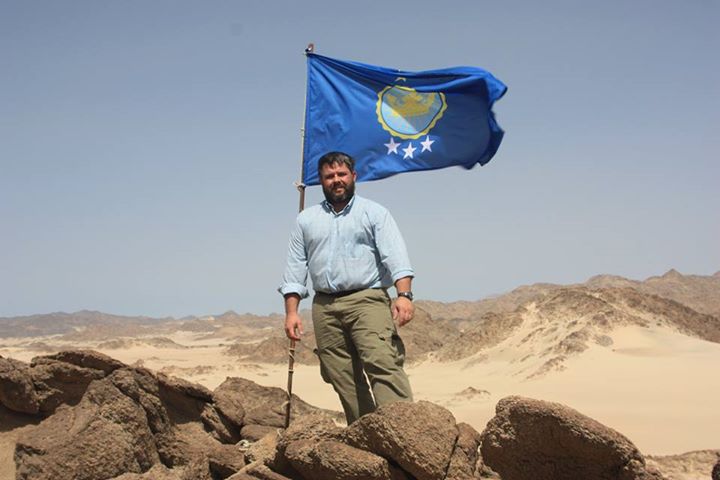Man 'founds country' to make daughter a princess
American starts world's first crowdfunding page to set up a kingdom in northeast Africa

A free daily email with the biggest news stories of the day – and the best features from TheWeek.com
You are now subscribed
Your newsletter sign-up was successful
An American farmer has started a crowdfunding page in a bid to create a new country on unclaimed land in the desert sands of northeast Africa.
Jeremiah Heaton, a resident of Virginia, said that the campaign will raise money to help his daughter Emily become a "real princess".
The area of land Heaton has identified for his new state lies between Sudan and Egypt and is known as Bir Tawil. On 16 June 2014, he posted a picture of himself on Facebook planting a flag in the sand alongside the message: "So be it proclaimed on June 16, 2014, Emily's 7th birthday, that Bir Tawil shall be forever known as the Kingdom of North Sudan. The Kingdom is established as a sovereign monarchy with myself as the head of state; with Emily becoming an actual Princess ."
The Week
Escape your echo chamber. Get the facts behind the news, plus analysis from multiple perspectives.

Sign up for The Week's Free Newsletters
From our morning news briefing to a weekly Good News Newsletter, get the best of The Week delivered directly to your inbox.
From our morning news briefing to a weekly Good News Newsletter, get the best of The Week delivered directly to your inbox.
According to Al-Jazeera, Heaton "had not expected many people to notice his declaration of independence. But his exploits went viral".
The farmer insists his claim to the land is legitimate, telling the Washington Post the planting of the flag "is exactly how several other countries, including what became the United States, were historically claimed".
The reaction has been, at best, mixed – with Al-Jazeera quoting a sceptical academic: "The moment he starts doing anything that looks remotely serious, they [Sudan] would [act]."
Heaton however, has big dreams for the Kingdom of North Sudan, writing on his indiegogo page: "In creating a new country, we have the opportunity to make it something truly extraordinary: a nation fully dedicated to researching and developing solutions for our current global food shortages and impending food crisis."
A free daily email with the biggest news stories of the day – and the best features from TheWeek.com
He continues: "In supporting the North Sudan Scientific Fund, you will be contributing to the world's largest scientific effort for finding a better way to grow and distribute food."
Despite Heaton's efforts to fulfil his daughter's wish, the budding princess's reaction was fairly muted.
"It's cool." Emily told a local newspaper.
After it became popular online, Disney purchased the film rights to Heaton's story. The Princess of North Sudan will, according to The Hollywood Reporter, be produced by Morgan Spurlock and be written by scriptwriter Stephany Folsom.
Spurlock is best known for his fast food documentary Super Size Me, while Folsom wrote an acclaimed script in 2013 called 1969: A Space Odyssey or How Kubrick Learned to Stop Worrying and Land on the Moon.
The film will depict the relationship between the Virginian farmer and his daughter "set against a backdrop of a fantastical adventure".
The reaction on Twitter to Disney's plan to make a film of the story has been overwhelmingly negative, with many questioning the film giant's decision making process.
Others have pointed out the similarity between Heaton's planted flag and a song in Disney's Pocahontas, when the eponymous heroine sings "You think you own whatever land you land on".
Folsom herself has answered criticism on Twitter, saying she "wouldn't write that story" and that the film will feature "no planting a flag in Sudan or making a white girl the princess of an African country".
Here are some other attempts to declare independent states from around the world:
The Empire of Austenasia
The constitutional monarchy of Austenasia was set up after father and son, Jonathan and Terry Austen, sent a declaration of independence for their house in Carshalton, Surrey to their local MP in 2008. Austenasia now comprises of 18 properties across the UK which have all declared allegiance to the leadership of the Carshalton property. There have been two leadership changes since the creation of the empire – Terry's abdication in February 2010 and Esmund III's dismissal following a vote of no confidence in March 2011.
The Principality of Seborga
In 1963 resident Giorgio Carbone claimed that his town Seborga had never become part of the modern Italian state. In 1995, after a long campaign, the residents of Seborga voted in favour of independence from Italy. A local currency the 'luigino' was even issued from 1994 to 1996. Seborga currently has 320 citizens.
The Kingdom of Talossa
The first so-called 'micronation' to have its own webpage – the Kingdom of Talossa – was set up in 1979 by a 14-year-old boy from Wisconsin. Still in existence today, the kingdom has a current population of 222 and faced serious strife when a group of dissidents left the kingdom to set up the Republic of Talossa in 2004. The dissidents however returned to the kingdom in 2012 restoring peace to the area.